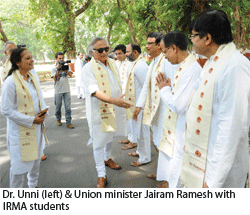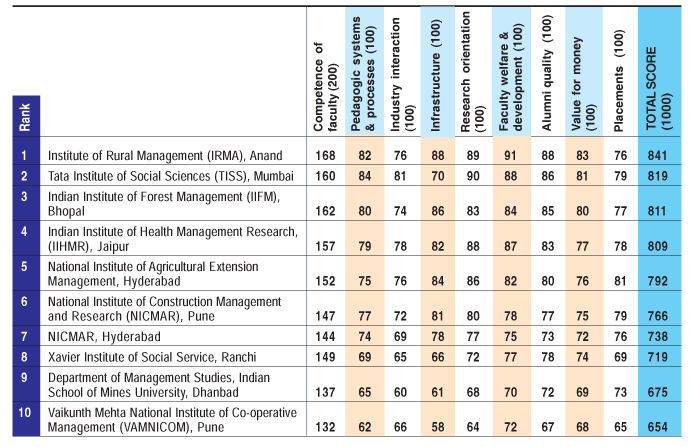With a large number of the country’s non-conformist youth entering the agriculture and social sectors, the EW-C fore survey presents a league table of not-strictly-business institutes
 With a growing number of the country’s youth taking to untrodden ways and careers in agriculture and the social sector, your editors decided it would be in the interest of the public, and particularly the students’ community, to rate and rank the country’s top social enterprise higher education institutions. Accord-ingly, the Delhi-based market research and opinion polling company C fore also shortlisted 25 not-strictly-business specialist schools for assessment by a respondents base comprising 532 B-school faculty members and 518 final year students. From the shortlist, low-profile social enterprise institutes eval-uated by less than 50 faculty members and students were eliminated.
With a growing number of the country’s youth taking to untrodden ways and careers in agriculture and the social sector, your editors decided it would be in the interest of the public, and particularly the students’ community, to rate and rank the country’s top social enterprise higher education institutions. Accord-ingly, the Delhi-based market research and opinion polling company C fore also shortlisted 25 not-strictly-business specialist schools for assessment by a respondents base comprising 532 B-school faculty members and 518 final year students. From the shortlist, low-profile social enterprise institutes eval-uated by less than 50 faculty members and students were eliminated.
Somewhat surprisingly, despite the respondents of the survey being industry-oriented B-school faculty and students, the Institute of Rural Management, Anand (IRMA), Gujarat, is ranked the country’s #1 social entrepreneurship institute. IRMA was promoted in 1979 by the legendary Dr. Verghese Kurien (1921-2012), who engineered the rural milk cooperatives-based Operation Flood which transformed milk-starved India into the world’s largest milk producing nation. Currently IRMA, whose mission statement is to “promote sustainable, ecologically-friendly and the equitable socio-economic development of rural people through professional management,” offers its two-year post-graduate programme in rural management, and a rural manag-ement fellowship programme to 400 students.
.gif) Despite the institute having withdrawn into its shell after the much-lamented death of Dr. Kurien in 2012, the informed respondents of this inaugural EW-C fore survey have rated IRMA #1 on seven of nine parameters of excellence. The highly-reputed Tata Institute of Social Sciences, Mumbai (TISS, estb. 1936 and rated #1 on the parameters of ‘pedag-ogic systems and processes’ and ‘research orientation’); Indian Institute of Forest Management, Bhopal (IIFM, estb. 1982); Indian Institute of Health Management Research, Jaipur (IIHMR, estb. 1984); and National Institute of Agricultural Extension Management, Hyderabad (estb. 1987), are ranked India’s Top 5 social enterprise institutes.
Despite the institute having withdrawn into its shell after the much-lamented death of Dr. Kurien in 2012, the informed respondents of this inaugural EW-C fore survey have rated IRMA #1 on seven of nine parameters of excellence. The highly-reputed Tata Institute of Social Sciences, Mumbai (TISS, estb. 1936 and rated #1 on the parameters of ‘pedag-ogic systems and processes’ and ‘research orientation’); Indian Institute of Forest Management, Bhopal (IIFM, estb. 1982); Indian Institute of Health Management Research, Jaipur (IIHMR, estb. 1984); and National Institute of Agricultural Extension Management, Hyderabad (estb. 1987), are ranked India’s Top 5 social enterprise institutes.
“We are very pleased to learn that IRMA is ranked India’s #1 social entrepreneurship education institution in your survey. Agriculture and agri-industry are neglected areas of the Indian economy, and the top ranking given by your informed respondents is a vindication of our efforts to introduce professional management into these sectors of the economy. I am especially pleased that IRMA has been ranked first on the parameter of ‘competence of faculty’ because teachers are our most scarce and precious resource. Therefore we take great care in ensuring they remain interested in their work by encouraging a mix of teaching, research and consultancy assignments, and housing them comfortably on our fully residential campus. Because our faculty is actively engaged in varied productive work, IRMA enjoys great personnel loyalty and attracts highly qualified and motivated teachers,” says Dr. Jeemol Unni, an alumna of Gujarat and Jawaharlal Nehru universities, and former professor of economics who was promoted to the position of director of the institute in 2009.
